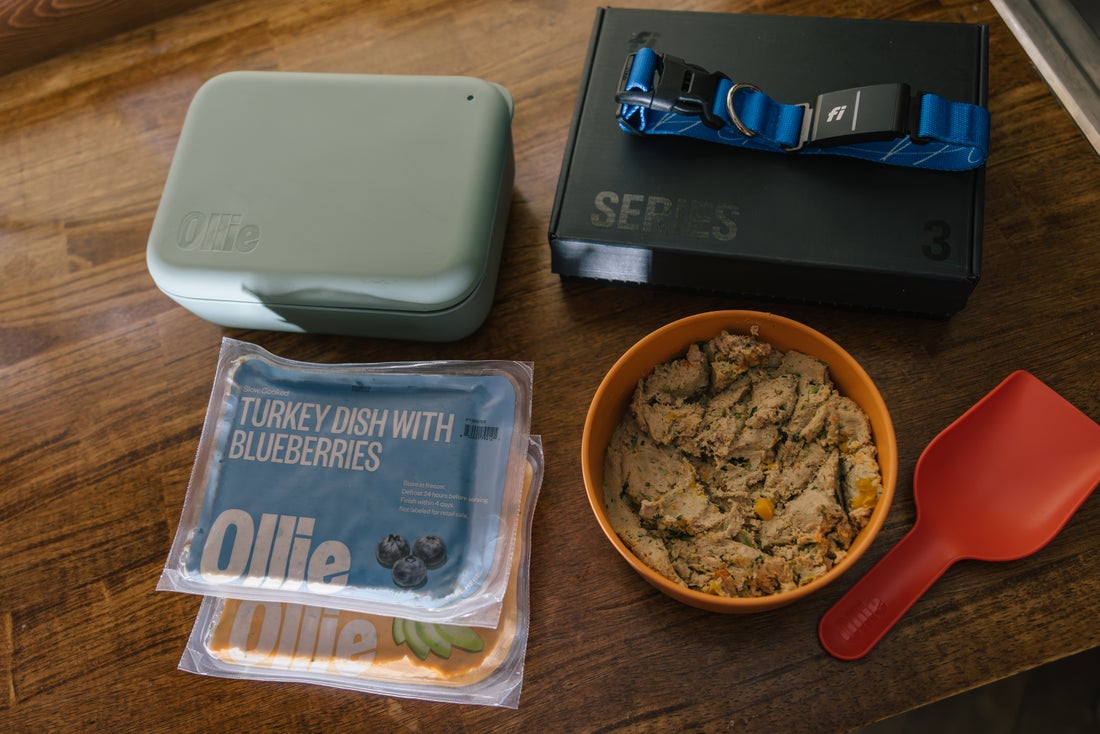Hey Ollie blog readers! We’re offering you an exclusive 60% OFF your starter box! Try now!
You have likely seen sunflower oil for sale at your local grocery store, or included in your favorite food’s ingredients list, because the oil is often used for low temperature stove-top cooking and in processed foods. But, you may also have seen that sunflower oil is often listed as an ingredient on your dog’s food label. Recent marketing trends suggest that dogs are carnivores who need animal proteins and fats to thrive—so, you wonder, why does your pet’s food include a plant-based oil?. Additionally, you know many plants and human food ingredients are toxic or unhealthy for dogs—so, you ask, is sunflower oil safe for dogs? And, is sunflower oil good for dogs?
The pet food industry is swimming with misinformation, and your dog’s nutritional needs are much more complex than simply requiring meat and animal fats to thrive. While entirely plant-based diets are not for every dog, plant proteins and fats can play an important role in nourishing your dog’s health while also minimizing environmental impact. To understand whether sunflower oil is healthy for dogs, you first need to understand fat’s role in your dog’s diet, and how fats must be balanced for optimal health.
Dietary fat function in dog nutrition
Humans tend to malign dietary fat, but this essential nutrient actually plays a vital role in canine health. Fat is not only a concentrated energy source that your dog can store or burn for fuel, but also serves the following functions:
- Enables fat-soluble vitamin absorption and storage
- Improves food taste
- Modulates inflammation
- Provides vital cell structure components
- Affects brain and nervous system development
- Can improve skin and coat health1
A certain dietary fat amount is necessary to maintain your pet’s normal body functions, with more needed to promote good energy balance. Higher-fat dog diets are more energy-dense, so young, active, high-energy dogs can eat less food and still take in enough calories to support their activity level. Lower-fat diets can help overweight, senior, or sedentary dogs lose weight by providing less energy density while they eat a larger food volume and still feel full. The right fat balance helps maintain your dog’s weight, activity, and overall health, and most dogs thrive on a moderate to high fat diet, depending on their life stage. Low fat diets are suitable for pets who are overweight or have medical conditions that impair fat metabolism.
Fatty acid balance in dog food
Dietary fats are made of individual components called fatty acids that serve different roles in the body. The body cannot produce essential fatty acids on its own, so these must be supplemented in the diet. Essential fatty acids come in two classes, omega-3 and omega-6, and are named based on their chemical structures.
- Omega-3 fatty acids — These include linoleic acid (LA), eicosapentaenoic acid (EPA), and docosahexaenoic acid (DHA), come mostly from fish, marine algae, or flaxseed, and are necessary for proper development.
- Omega-6 fatty acids — These include alpha-linolenic acid (ALA) and arachidonic acid (AA), come from plant, vegetable, and animal fats, and play an important role in skin health.2
Each type is included in pet foods according to the minimum amounts established by the American Association of Feed Control Officials (AAFCO) for optimum dog health. Dogs generally need more omega-6 than omega-3 fatty acids, and diets for pregnant, nursing, or growing dogs include extra DHA and EPA. Some pets with skin or inflammatory medical conditions like allergies or arthritis can benefit from fatty acid supplements, but throwing the balance off too far can result in clotting or immune system problems, so veterinary supervision is required.1
Can dogs have sunflower oil?
Sunflower oil is one plant-derived fat type that can be included in pet foods. The oil contains the same energy amounts as other fat types, has omega-6 fatty acids necessary for skin and coat health, and offers high antioxidant vitamin E levels.
Are sunflowers toxic to dogs?
According to the ASPCA toxic and non-toxic plants list, sunflowers are completely non-toxic to dogs, and their oil provides healthy fats3 and is safe for consumption when the pet food is balanced with other fat sources and provides an optimal fatty acid ratio. Sunflower oil is also derived exclusively from plants, and many sunflower crops are grown and harvested in the United States, which helps to support local farming communities.4
Is sunflower oil good for dogs?
Sunflower oil can be a healthy source for the dietary fat that dogs need. The oil provides energy, supports your dog’s skin and coat, and is provided by locally grown crops. For vegan and vegetarian pet owners, sunflower oil provides an ethical, plant-based fat source. Sunflower oil is generally safe for dogs as part of a balanced diet, and supplements can help some dogs with skin problems. Remember—always consult your veterinarian prior to starting any new supplement to ensure they will be safe and healthy for your particular pet. You can always rest assured that every Ollie diet contains ingredients safe for dogs.
Sources:
Tagged As:

The nutrition your dog needs,
the food they want.

Enjoying our articles? Subscribe our Newsletters and get new articles directly to your inbox
You might also like
18 September 2025
5 MINS READ
Can I Rotate Fresh Dog Food Flavors?
Yes, it’s safe to rotate fresh dog food flavors, and many dogs actually benefit from the variety. At Ollie, we offer multiple fresh recipes, like Beef, Chicken, Turkey, Lamb, and Pork so you can…
by Ollie Pets
18 September 2025
5 MINS READ
Is Fresh Dog Food Safe During Power Outages?
Fresh dog food is only safe during a power outage if it has stayed cold, specifically, below 40°F. Once the temperature rises above that point, bacteria can start to grow, and the food may no lon…
by Ollie Pets
18 September 2025
5 MINS READ
How Do I Store Fresh Dog Food While Traveling?
If you’re bringing fresh dog food on the road, keeping it cold is key. The best way to store it is in a cooler with ice packs or a travel freezer. At Ollie, our vacuum-sealed fresh food stays good…
by Ollie Pets







